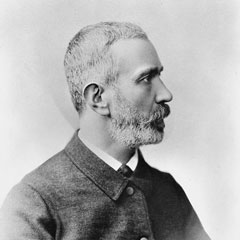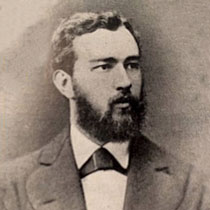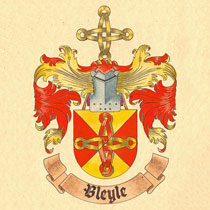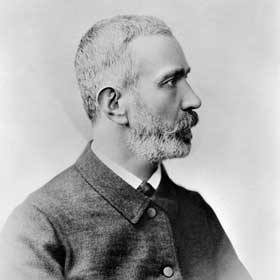



Wilhelm Bleyle
at the age of 27 years
Hermann Wilhelm Bleyle
lived from *07.04.1850 to †16.02.1915,
he married his wife Wilhelmine Veigel (*1852 - †1910 ) 1877.
They had six children, three sons and three girls.
Hier ist dann der Weiterlesen Text Hier ist dann der Weiterlesen Text Hier ist dann der Weiterlesen Text Hier ist dann der Weiterlesen Text Hier ist dann der Weiterlesen Text Hier ist dann der Weiterlesen Text Hier ist dann der Weiterlesen Text Hier ist dann der Weiterlesen Text

family crest Bleyle
Karl Anton Wilhelm (*1878), profession as Businessman
Hermann Max (*1881—†1965) emergence 1895 in the family company, 1907 Technical Director & the Father’s right hand, receives early procuration status, since 1913 co-partner of the company.
Karl August (*1889—†1926), composer
Friedrich Ernst (*1890—†1976), graduate Businessman, 1913 co-partner of the family business
Karoline Wilhelmine (*1882)
Marie Mathilde Amalie (*1885—†1925) married with Arthur Weber (*1882).
Luise Antonie Helene (*1887)
Wilhelm Bleyle saw first the light of the world on April 7th, 1850 in Feldkirch - Vorarlberg, and grows up as the youngest of five children in poor circumstances. The father of professional watchmakers, his ancestors’ smiths – eight generations in succession.
Under lucky circumstances Wilhelm Bleyle succeeded to join Innsbruck high school through a scholarship. The lessons there were oriented for scientific and practical life. Furthermore, he was talented which came back on him with benefits in his later raised plans.
The wide fabrication which showed up in the future was in many ways the child of his time. as a fearless entrepreneur with a pioneering spirit and few capitals. As a machine creditor he pushed toward the awakening and transformation wheel from the hand workshops to the factory plant. Evaluated from a hard worker to a tough employer than miserly merchant and ambitious self-made man.
Above all, Wilhelm Bleyle was a child of his swabian-alemannic-pietist home and a craft for generations preconceived parents' house. He wants to be a merchant and have a career. The chances seem to him - first smart entrepreneurs decision - to be greater in the german-wilhelmin part of the region, as the austrian-habsburg. He goes to Ulm and completed an apprenticeship as a retail merchant in Ulm Cigar shipping business Schultheß, where he learned the close contact and dealing with customer gets to know the specifics of retailing .
Hardly finished learning, it drives the young Bleyle out of the staid confines of Ulmer Province. In the city of Stuttgart, one of the most powerful emerging cities of the young German Empire, the gold and silver goods factory Maercklin & Co. has advertised the post of first bookkeeper. Wilhelm is set as an accountant, although he lacked any experience in this field. His determination and discipline helped him in a very short time the necessary knowledge of double-entry bookkeeping appropriating itself. Wilhelm Bleyle has namely at this time no idea about the mysteries of the double-entry bookkeeping.
The job interview is on a Saturday morning, next Monday morning he will begin already, as office manager of a four-person department. There hlep only two enterpriser´s virtues: diligence and almost unlimited capacity to learn. Wilhelm Bleyle buys a textbook for double-entry bookkeeping, cramming half days and two nights and presents himself on the Monday morning as a perfect chief accountant. Once in office, says the new chief accountant to his joyfull pricking up the ears bosses, half of his accounting colleagues is really unnecessary, one could create the same work instead of with four as well with two ones. After a short time it turned out that Wilhelm is a born " natural sellers " - proved successful. He had the ability to win both the customers and the management of its own. Early at the age of 26 years Wilhelm received the company procuration status and had a good income .
At this point the biography of the later sailor suit king gets a jump. The jump leads back in the Austrian native country and lasts twelve years. Because the brother wants to emigrate finally to America, somebody must look at home after his groceries store - and after an old mother. He breaks off his precipitous manager's career programmed on independent employers with Märcklin and returns where he had come: in the narrowness of the provincial town and in the depressions of the retail trade. In the same 1877 he married Wilhelmine Veigel, the daughter of an Untertürkheimer innkeeper of the Crown Inn. During this time Wilhelm led a quiet and lower middle-class family life and founded his great family with 6 children.
At the age of 35 years Wilhelm Bleyle decided to produce knitwear himself. In 1884 he intensely started to deal with cord clothing and production technology. He bought hand knitting machines and put two employees. He knits socks and knee-high, soon also vest and skirts, finally, even a whole suit. Beside own products Wilhelm already sold knitwear of other suppliers and he recognised the potential of knitted clothing on account of the rising inquiry.
The profit of a premium on the land exhibition in Bregenz shows him that he could also exist on the regional level with it. But Wilhelm Bleyle is not contented yet. He took not least up a trend of his time, because cord clothing was propagated in the course of the life reform movement as extremely health-supporting and practical. Wilhelm Bleyle dealt with the thought of his ingenious idea as he is able to do according to manufacture whole cord suits made to measure without letting knit all individual parts on measure as before – only in time-consuming and cost-robbing manner moving. To him comes the idea to manufacture in roads made cord material according to cut pattern in single parts. In case of Bleyle it is selfknitted, and in the best word sense: Brilliantly simply - and, therefore, simply brilliantly.
To be able to exercise his enterprise idea, he returned with his family to Stuttgart and founded on the 28th of March, 1889 at the age of 39 years his knitwear production. In the property Kasernenstrasse 20 he begins, according to entry in the Stuttgart trade change register on the 1st of April a thread action with "manufacture and sales of knitted goods". The machine park exists of five cords or sewing machines, the staff from eight employees: To a tailor, a seamstress, five knitters or female knitters. The foundation time is happily chosen. The inquiry for knitted woollen clothing develops really fast. Above all the expanding market of the child clothing required after a hold, stretchy and washable, besides healthy and practical and not least essential cheaper alternative to the knit material suit.
Also the foundation place could not have been chosen wiser and more happily. If hunter of one of the decisive authorities in the area of the hygienic clothing apprenticeship sits, nevertheless, in the Stuttgart polytechnic with the professor Gustav Jäger, he teaches in his lectures: „Want the ideal material is for the hygienic clothes of the modern, healthy person. “ Also emperor Wilhelm who has ascended his throne shortly before the company foundation is a follower of the care of the national naval enthusiasm.
Bleyle was the first one which introduced a system of standard dimensions - to the use of trade and of course also to the own in the branch. Already a year after company foundation Wilhelm Bleyle began with the production and the distribution of a Bleyle-boy's suit in the form of a Bleyle sailor suit - with the success that one soon becomes the synonym of the other. Since on the one hand the standardized dimensions system accelerated and made easier the sales process in the store, on the other hand, it served substantially to rationalise the production further and to diminish thus the enterpriser's risk further and the sailor suit was valid manufacturing because of his agreed basic form already as ideal for the ready-to-wear.
It was also the first one which pursued a professional advertisement in the branch: With posters and advertisements, prospectuses and catalogues, picture signs and slogans ("Bleyle `see boy's suits are the best"). And the Bleyle advertisement - like later the classical "Käfer" advertisement - for decades away over and over again hammered the same three product advantages (quality, durability, customer service) as a basic subject with variations in the brains of the consumers. Eleven years later he owned a factory with 180 employees which grew on and on. In 1903 the branch factory originated in Brackenheim, in 1905 the Ludwigsburger factory. The enterprise produced not only for the home market, but also exported in the European foreign countries and in the USA.

Wilhelm Bleyle
In 1913, two years before his death, Wilhelm retired from business life. His wife passed away in 1910, which broke his heart. The estimated sales for this period was about 5 million marks. The sons Fritz and Max Bleyle took over together with her brother-in-law Arthur Weber the management. In 1915, at the age of 65 years Wilhelm Bleyle died after long, heavy suffering.
He had a charismatic personality with a big heart and a spirit that was both creative and open to innovations. With a lot of vitality and ingenuity became Wilhelm Bleyle from insignificant seller to a successful industrialist.